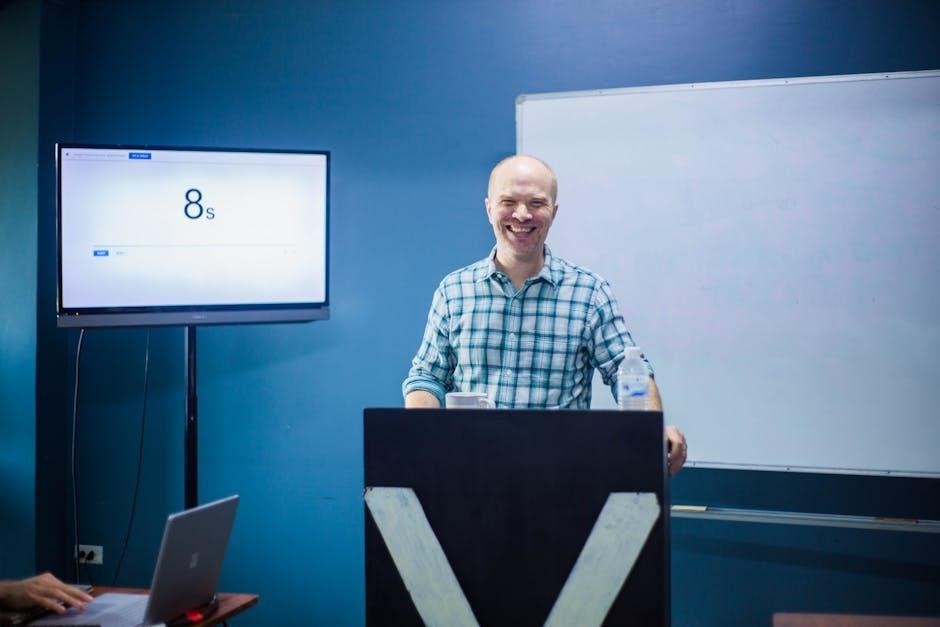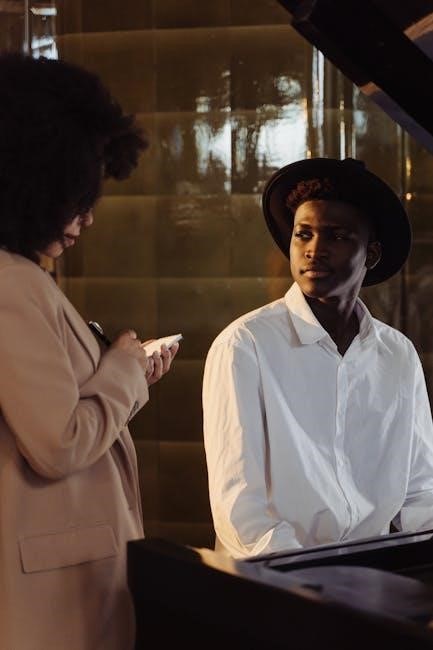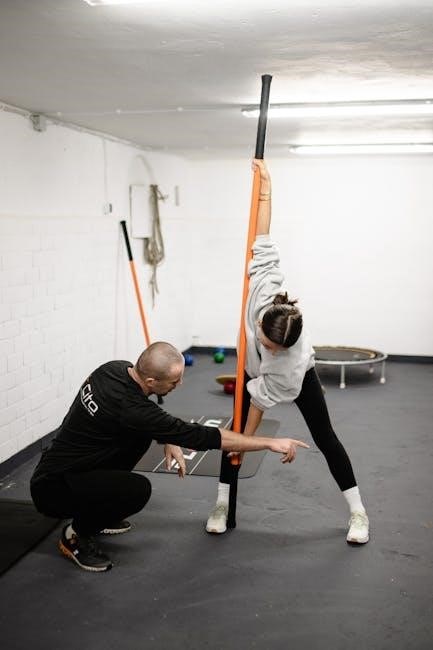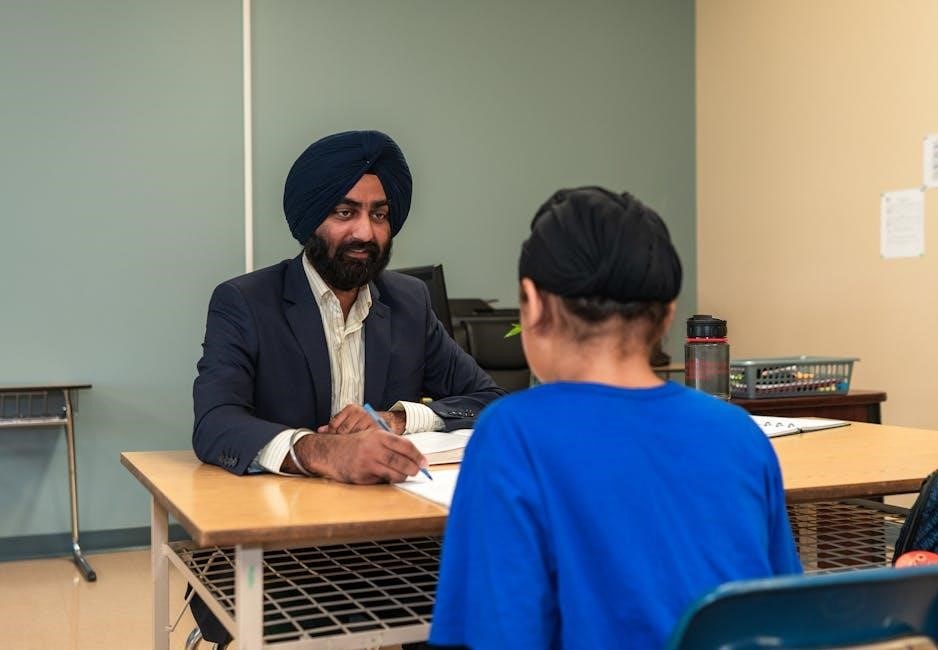General Background and Motivation Questions
Passionate about education‚ I aim to foster teacher growth and student success. With a deep understanding of your school’s commitment to excellence‚ my teaching experience equips me to support educators effectively‚ driving instructional improvements and enhancing learning outcomes for all students.
Why do you want to be an instructional coach?
I am passionate about education and dedicated to fostering teacher growth and student success. My desire to become an instructional coach stems from my belief in the power of collaboration and professional development. I want to support educators in refining their practices‚ leveraging my teaching experience to create impactful learning environments. This role allows me to empower teachers‚ drive instructional innovation‚ and contribute to a culture of continuous improvement. I am excited to help educators and students thrive‚ aligning my educational philosophy with the school’s mission to enhance teaching and learning outcomes.
What do you know about our school/district?
Your school/district is renowned for its commitment to innovation‚ equity‚ and student-centered learning. I admire the emphasis on fostering a supportive environment that encourages both teacher and student growth. The district’s focus on professional development and community partnerships aligns with my coaching philosophy. I am impressed by the initiatives aimed at closing achievement gaps and integrating technology into classrooms. Understanding the unique needs and strengths of your district‚ I am eager to contribute to its mission of providing high-quality education and empowering educators to create impactful learning experiences for all students.
How does your teaching background prepare you for this role?
My teaching background has equipped me with a deep understanding of classroom dynamics‚ curriculum design‚ and instructional strategies. Experience in lesson planning‚ differentiated instruction‚ and data-driven decision-making has honed my ability to support teachers in improving student outcomes. I’ve developed strong communication and interpersonal skills‚ fostering collaboration among colleagues. My classroom experience also taught me adaptability‚ empathy‚ and the importance of meeting diverse needs. These skills enable me to connect with teachers‚ identify their strengths‚ and provide targeted coaching to enhance their instructional practices effectively. My teaching expertise forms a solid foundation for empowering educators and elevating student achievement.

Coaching Style and Philosophy
My coaching style is collaborative‚ teacher-centered‚ and data-driven‚ focusing on empowering educators to enhance instructional practices. I prioritize building trust‚ fostering creativity‚ and supporting personalized growth to ensure student success and teacher confidence.
What is your vision for this role?
My vision is to empower teachers through collaborative‚ evidence-based practices‚ fostering a culture of continuous improvement and innovation. I aim to support educators in refining their instructional strategies‚ enhancing student engagement‚ and achieving measurable academic growth. By building trust and providing tailored coaching‚ I strive to create a professional learning environment where teachers feel confident and motivated to implement best practices. Ultimately‚ my goal is to contribute to a school community that prioritizes both teacher development and student success‚ ensuring equitable and impactful learning experiences for all.
What instructional coaching qualities do you have?
I possess strong communication and interpersonal skills‚ enabling me to build rapport with teachers and facilitate meaningful conversations. My ability to listen actively and empathize allows me to understand educators’ needs and tailor coaching strategies accordingly. I am data-driven‚ using evidence to inform decisions and measure progress. Additionally‚ I bring a growth mindset‚ fostering a culture of continuous improvement and innovation. My collaborative approach ensures that teachers feel supported and empowered to implement effective instructional practices. These qualities enable me to create a professional learning environment focused on teacher development and student success.
What are the key components of your coaching philosophy?
My coaching philosophy centers on empowering teachers through collaborative relationships‚ personalized support‚ and data-driven practices. I believe in fostering a growth mindset‚ encouraging educators to reflect on their practices and embrace innovation. Trust‚ respect‚ and open communication are foundational to my approach. I focus on teacher autonomy‚ providing tailored strategies to meet their unique needs. Additionally‚ I emphasize the use of evidence to inform decisions and measure progress. My philosophy is student-centered‚ ensuring that all coaching efforts ultimately enhance learning experiences and outcomes. By creating a safe‚ supportive environment‚ I help teachers thrive professionally and make a meaningful impact in the classroom.

Building Relationships and Trust
Building relationships and trust starts with active listening‚ empathy‚ and collaboration. I focus on shared goals‚ open communication‚ and celebrating successes to foster a supportive environment.
How would you build relationships and trust with teachers?
Building relationships and trust with teachers begins with empathy and active listening. I prioritize understanding their challenges and celebrating their successes. By fostering open communication and collaboration‚ I create a safe‚ non-judgmental space for teachers to share their concerns. My approach emphasizes shared goals‚ transparency‚ and mutual respect. I believe in empowering teachers by offering tailored support and resources. Trust is further strengthened through consistent follow-through and maintaining confidentiality when needed. These actions help establish a foundation of credibility and partnership‚ essential for effective instructional coaching and collective growth.
What steps do you take to develop trust with teachers?
Developing trust with teachers requires consistent transparency‚ empathy‚ and reliability. I start by actively listening to their concerns and goals‚ ensuring they feel heard and valued. I maintain confidentiality when necessary and always follow through on commitments. By being approachable and non-judgmental‚ I create a safe environment for open dialogue. I also collaborate with teachers to set shared goals‚ demonstrating my commitment to their success. Celebrating their achievements and providing constructive feedback further strengthens trust. These actions build credibility and foster a partnership rooted in mutual respect and collaboration.
How do you approach a teacher who doesn’t want instructional coaching?
I approach reluctant teachers with empathy and respect‚ acknowledging their perspective and expertise. I focus on building rapport by understanding their specific challenges and goals. Rather than imposing my ideas‚ I invite collaboration‚ framing coaching as a supportive partnership. I emphasize the voluntary nature of coaching and tailor my approach to their comfort level. By listening actively and offering flexible strategies‚ I help them see coaching as a tool for their professional growth‚ fostering a non-threatening and teacher-centered environment that encourages voluntary participation and shared success.

Coaching Strategies and Practices
Fostering collaboration and empowering teachers through active listening‚ modeling best practices‚ and constructive feedback drives sustainable instructional growth and teacher confidence.

Can you describe a successful coaching strategy you implemented?
I successfully implemented a data-driven coaching cycle‚ starting with teacher collaboration to identify goals. Using classroom observations and student data‚ I provided tailored feedback and co-planned lessons. Modeling effective strategies and offering ongoing support‚ teachers gained confidence and refined their practices. This approach fostered trust‚ improved instructional techniques‚ and led to measurable student progress. Celebrating successes and reflecting on challenges ensured sustained growth‚ demonstrating the power of intentional‚ data-informed coaching to enhance teaching and learning outcomes.
How do you intentionally use questioning when working with others?
I use questioning to explore ideas‚ clarify thoughts‚ and encourage reflection. Open-ended questions help teachers articulate their beliefs and practices‚ fostering deeper thinking. I also use Socratic questioning to challenge assumptions and promote critical reflection. By asking probing questions‚ I guide teachers to identify needs‚ set goals‚ and monitor progress. For example‚ “What do you hope students will learn from this lesson?” or “How do you think students will respond?” These questions empower teachers to take ownership of their growth and make data-driven decisions‚ ultimately enhancing instructional effectiveness and student outcomes.
What strategies do you use to build trust and collaboration?
To build trust and collaboration‚ I prioritize active listening‚ empathy‚ and transparency. I establish clear communication channels‚ ensuring teachers feel heard and valued. By being approachable and non-judgmental‚ I foster a safe environment for open dialogue. I also emphasize shared goals‚ aligning my support with teachers’ needs and student outcomes. Celebrating successes and providing constructive feedback strengthen relationships. Additionally‚ I offer flexible coaching methods‚ empowering teachers to take ownership of their growth. These strategies create a collaborative culture rooted in mutual respect and shared accountability‚ driving meaningful professional development and improved instructional practices.

Common Challenges and Problem-Solving
Overcoming resistance and measuring impact are key challenges. I address these by fostering collaboration‚ using data-driven strategies‚ and continuously refining approaches to ensure effective problem-solving and growth.
What do you think are the biggest challenges in this role?
One of the biggest challenges is overcoming resistance from teachers who may be hesitant to adopt new practices. Building trust and demonstrating the value of coaching can be difficult. Additionally‚ balancing the need to support teachers while driving accountability for student outcomes requires careful navigation. Another challenge is interpreting and applying data effectively to inform coaching strategies. Time management and prioritizing tasks to meet diverse teacher needs can also be complex. Finally‚ staying adaptable to changing educational priorities and maintaining a growth mindset are essential to succeed in this dynamic role.
How do you handle resistance from teachers?
When encountering resistance‚ I first seek to understand the teacher’s perspective through active listening. Building trust is crucial‚ so I focus on their goals and challenges‚ aligning my support to their needs. I emphasize collaboration‚ ensuring they feel empowered rather than dictated to. By offering choices and involving them in decision-making‚ I foster a sense of ownership. I also highlight the benefits of coaching‚ such as improved student outcomes‚ to help shift their mindset. Patience and consistency are key‚ as trust and openness often develop over time. Celebrating small successes can also help reduce resistance and encourage engagement.
How do you handle a difficult coaching conversation?
When faced with a challenging coaching conversation‚ I prioritize empathy and active listening to understand the teacher’s perspective. I remain calm and composed‚ focusing on the issue rather than taking it personally. By asking open-ended questions‚ I encourage reflection and collaboration‚ aiming to find a mutually beneficial solution. If emotions escalate‚ I suggest taking a break to revisit the discussion when emotions have settled; I also maintain professionalism‚ document key points‚ and emphasize growth opportunities‚ ensuring the conversation remains constructive and focused on improvement.

Professional Development and Growth
I stay current with best practices by attending workshops‚ collaborating with peers‚ and engaging in continuous learning. I seek opportunities to refine my coaching strategies and measure their impact effectively.
How do you stay current with best practices in education?
To stay current‚ I engage in ongoing professional development through workshops‚ conferences‚ and online courses. I participate in peer collaborations‚ educational research‚ and professional organizations to stay informed about innovative teaching strategies. Additionally‚ I regularly review educational publications and follow thought leaders in the field. By consistently updating my knowledge and skills‚ I ensure my coaching practices align with evidence-based methodologies‚ enabling me to support teachers effectively and drive student success.
What professional development opportunities would you seek?
I would pursue opportunities like advanced instructional coaching certifications‚ such as the Certified Instructional Coach (CIC) program‚ to deepen my expertise. Additionally‚ I would attend education conferences‚ workshops‚ and webinars focused on innovative teaching strategies and leadership development. Engaging in peer coaching networks and collaborating with other educators would also be a priority to share best practices. Mentoring programs and university courses on education leadership would further enhance my skills‚ ensuring I remain equipped to support teachers effectively and drive continuous improvement in educational practices.

How do you measure the impact of your coaching?
To measure the impact of my coaching‚ I would use a multifaceted approach. First‚ I would gather feedback from teachers through surveys‚ one-on-one interviews‚ and focus groups to understand their perceived growth and challenges. Second‚ I would analyze student performance data to see if coaching efforts have led to improved academic outcomes. Third‚ I would observe classroom practices to assess the implementation of new strategies. Finally‚ I would track the progress of action plans created with teachers‚ ensuring alignment with school goals and quantifiable results‚ allowing for continuous refinement of my coaching strategies.

Data-Driven Practices
Data informs my coaching strategies by identifying areas of improvement‚ measuring progress‚ and assessing the effectiveness of instructional practices. It ensures decisions are grounded in evidence.
What role does data play in your professional practice?
Data plays a pivotal role in my professional practice as an instructional coach. It serves as a foundation for identifying teacher and student needs‚ monitoring progress‚ and evaluating the effectiveness of instructional strategies. By analyzing data‚ I can pinpoint areas where teachers may need additional support or resources. Data also informs my coaching strategies‚ ensuring they are tailored to address specific challenges and measurable goals. Regularly reviewing data allows me to track growth over time and make informed decisions; Ultimately‚ data-driven practices help me support teachers in achieving better outcomes for all students‚ fostering a culture of continuous improvement and equity.
How do you use data to inform your coaching strategies?
Data is a cornerstone of my coaching approach. I analyze student performance‚ classroom observations‚ and teacher feedback to identify trends and areas for growth. By examining this information‚ I can pinpoint specific needs and tailor my strategies to address them. For example‚ if data shows a gap in student understanding‚ I work with teachers to refine their instructional methods. I also use data to set measurable goals and track progress‚ ensuring that coaching efforts are aligned with student outcomes. This collaborative‚ data-driven process fosters continuous improvement and ensures that my support is impactful and targeted.
How do you assess the effectiveness of your coaching?
Evaluating coaching effectiveness involves tracking teacher progress‚ student outcomes‚ and feedback. I set measurable goals with teachers and monitor their implementation through classroom observations and data analysis. Teacher feedback surveys and self-assessment tools help gauge the impact of my support. I also review student performance data to ensure coaching strategies are improving learning. By regularly reflecting on these metrics and adjusting my approach‚ I ensure that my coaching is driving meaningful growth and achieving intended results. Continuous improvement is at the heart of my assessment process.

Next Steps and Expectations
In the first 90 days‚ I’d build relationships‚ understand teacher needs‚ and align coaching strategies with school goals. Long-term‚ I aim to foster a culture of continuous improvement and collaboration‚ ensuring teachers feel supported and empowered to enhance student learning. By establishing trust and providing tailored support‚ I envision a school community where instructional excellence thrives‚ and teacher growth directly impacts student success. Open communication and shared expectations will guide my efforts to create a sustainable‚ impactful coaching program.
What will you do in the first 90 days as an instructional coach?
In the first 90 days‚ I would focus on building relationships and understanding the school’s culture. I’d meet with teachers to learn about their challenges and strengths‚ observing classrooms to identify needs. By listening actively and asking reflective questions‚ I’d establish trust and collaboration. I’d also align my coaching strategies with the school’s goals‚ developing a plan tailored to support educator growth. This period would lay the foundation for a productive partnership‚ ensuring that my coaching efforts address specific needs and foster a culture of continuous improvement. Open communication and mutual respect would guide my approach.
What are your long-term goals for this role?
My long-term goal is to foster a culture of continuous improvement‚ empowering teachers to enhance their instructional practices and student outcomes. I aim to collaborate with educators to identify and achieve personalized professional growth goals‚ ensuring alignment with the school’s mission. By leveraging data to evaluate impact and staying updated on best practices‚ I will refine my coaching strategies to meet evolving needs. Ultimately‚ I strive to create sustainable systems that support teacher development and contribute to the school’s long-term success‚ ensuring that all students receive high-quality instruction and achieve their full potential.
What support systems would you put in place for teachers?
To support teachers effectively‚ I would establish professional development opportunities tailored to their needs‚ such as workshops‚ one-on-one coaching sessions‚ and peer collaboration groups. I would also create feedback loops‚ ensuring teachers receive constructive‚ actionable insights to refine their practices. Additionally‚ I would foster a growth mindset culture‚ encouraging teachers to take risks and innovate. By providing access to resources like educational research‚ technology tools‚ and data-driven strategies‚ I aim to empower teachers with the tools and confidence to enhance their instructional practices and improve student outcomes.
